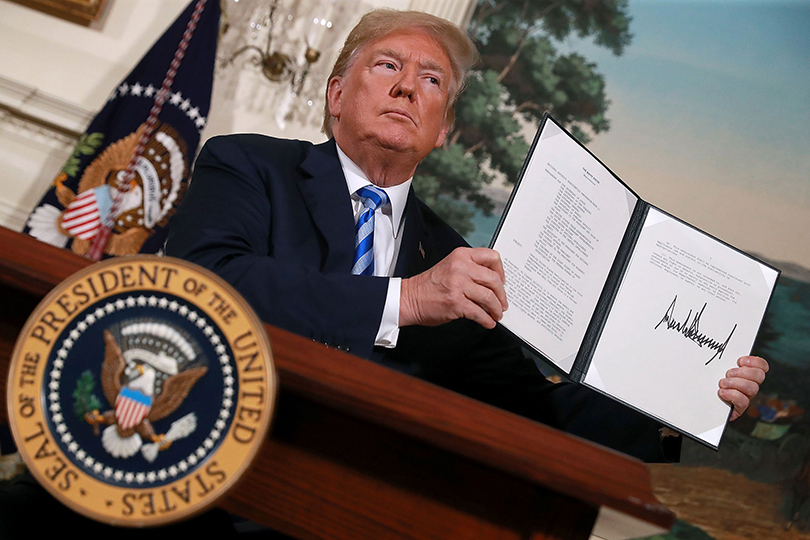Adnan Abu Zeed
Iraq's official stance on the US withdrawal from the Iranian nuclear deal was critical of the United States. The Iraqi Ministry of Foreign Affairs expressed its regret over the withdrawal, which it described in a May 9 statement as a “hasty and uncalculated decision.” It said the decision “would escalate matters and only bring about destruction and ravages of war, which the region has already suffered from a great deal.”
Foreign Minister Ibrahim al-Jaafari said May 16 that the US withdrawal was a "form of foolishness” and that “all of the world's countries have lost trust in the US following this withdrawal.”
Will Iraq support Iran and be a part of the axis opposing the United States? And what role will the Shiite armed faction assume?
Wathiq Jabri, an adviser for the Iraqi Center for Media Development, told Al-Monitor that the Iraqi stance, which is “considerate of the Iranian policy,” is understandable, as the US withdrawal from the nuclear deal will have a negative political and economic impact on Iraq. While the United States has influence in Iraq, there are also Iraqi forces that have solid ties with Iran.
Jabri said, “Iraq's location, being adjacent to Iran, and the strategic relations linking the two countries are other reasons for Iraq to be affected by US-Iran relations.”
He added, “There are political forces that are inclined toward the United States and others toward the Iranian side, which will be exhibited in the formation of the next government, with each party seeking to pressure its loyal parties in shaping the government.”
Jawad Bashara, a political adviser and researcher for France 24 and Radio Monte Carlo Doualiya, justified the Iraqi position, saying, "The new development will result in sanctions and pressures on whoever has economic and commercial ties with Iran.”
These pressures have already started, as the Central Bank of Iraq imposed sanctions on Al-Bilad Islamic Bank on May 17, after the US Treasury Department added the bank's name to the terrorism list for transferring funds from the Iranian Islamic Revolutionary Guard Corps to Lebanese Hezbollah.
Given the proxy wars between Iran and Saudi Arabia in both Syria and Yemen, there are fears that the US withdrawal could push Iran to be involved in aggressive policies on a wider scale in several regional dossiers. The growing US pressure on Iran could raise its Shiite religious leadership’s determination to preserve its support for Iraq’s Shiites. For Iran, Iraq is an important Arab country. It is perhaps even more important than Syria and Lebanon, where Iran holds broad political and military influence.
“Such an interpretation of events is unacceptable,” said Haneen al-Qado, a leader of the Fatah alliance. He told Al-Monitor, “Iraq is a part of a regional conflict involving the United States, Iran and other countries. The United States, not Iran, is the one that wants to involve Iraq in this conflict, by sanctioning for instance Iraqi parties and banks.” He added, “Iraq is an independent state, and the government should put a halt to the US meddling in the affairs of Iraq, if the latter desires to maintain its sovereignty.”
Worries that Iraq could turn into a battlefield for the US-Iran conflict following President Donald Trump’s withdrawal decision are growing among Iraqis. Nevertheless, Karim al-Nouri, the spokesman for the Fatah list, reassured his fellow citizens, telling Al-Monitor, “The Popular Mobilization Units’ [PMU] main goal is to promote stability in the country.”
At the same time, Nouri denied allegations that the PMU “acts” upon Iran’s instructions. He said, “The PMU is not an Iranian tool in the hands of Tehran. It is a security establishment under the command of the armed forces’ general commander. Parties seeking to cause fear among regional countries and to undermine the balanced relations between the two neighboring countries are reinforcing the speculation that the PMUs will be used as an Iranian card against the United States in Iraq.”
The fear that Iraq will turn into a large battlefield prompted Hisham Er-Rukabi, the spokesman for Vice President Nouri al-Maliki, to stress the need for “calm at the current stage, since the decision to withdraw [from the Iran deal] has inflamed the region and brought Iraq back to square one."
Rukabi told Al-Monitor, “Iraq has been able to overcome many challenges, most recently the war on the Islamic State. The regional factor and international conflicts that turned Iraqi territory into a battlefield were behind the repercussions of these crises. The recent US decision could further worsen the situation and eliminate the chance for stability.” He hoped that “Washington reconsiders the decision to withdraw from the nuclear deal as the region stands on the brink of an abyss.”
In parallel with the political and security implications, Iraqi Oil Ministry spokesman Assem Jihad told Al-Monitor, “Just like the rest of the oil producers and consumers, Iraq will be affected by the spillover effects of Trump’s withdrawal of the nuclear deal.”
No doubt the Iranian-backed political forces and armed factions decline to be labeled as being “affiliated with Iran,” saying they are defending their country's interests above all. Nevertheless, developments in Iraq, Syria and Lebanon will require these forces to give their backing to the state providing them with political, if not with financial, support. When it comes to Iraq, Iran is the biggest ally of the Shiite factions.







Comments